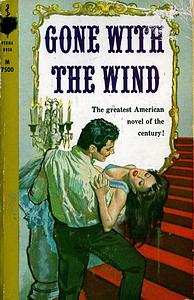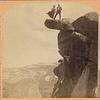Take a photo of a barcode or cover
It is kind of challenging to really review this book. In part because it has been around for over 70 years and has already been written about and talked about and debated about for decades. And also because of the overt and casual racism sprinkled throughout the book. It so suffuses and informs the book that you can't just overlook it or ignore it.
So, I'm of two minds about this one. On the one hand, there's a really great story here about Scarlett O'Hara and her unbeatable spirit and her desire to get what she wants at any costs. Scarlett is a completely unlikable character. Selfish, self centered, greedy, manipulative, and just downright unscrupulous and yet, I found myself drawn to her over and over again. Her desire to have Ashley really grated on me. Especially when it was never really clear what exactly Ashley had to offer. He seemed like just another mediocre white man.
This book is incredibly long, sometimes frustratingly so. The last few chapters are incredibly sad. So much so that it felt unnecessarily brutal to read.
The racism here is really tough to deal with, especially by modern eyes. The n word is used very liberally here. It is obvious that Margaret Mitchell actually believed these things about the African American population and her overt racism spills over into the book in many places that made me uncomfortable. Black people are portrayed as shiftless, lazy, and never question their place in society. Mammy in particular is a racist caricature of the nurse figure in black tropes. It's shameful and there is no excuse for it.
There are plenty of books out there that deal with the subject of the South and race relations in a better way than this one. This is basically just propaganda for the South and slavery. And there's even some praise of the Ku Klux Klan in here which is particularly reprehensible. Seek out other books if you are curious about life in the South during the Civil War and Reconstruction. Let this one be relegated to the dust bin of history where it belongs.
So, I'm of two minds about this one. On the one hand, there's a really great story here about Scarlett O'Hara and her unbeatable spirit and her desire to get what she wants at any costs. Scarlett is a completely unlikable character. Selfish, self centered, greedy, manipulative, and just downright unscrupulous and yet, I found myself drawn to her over and over again. Her desire to have Ashley really grated on me. Especially when it was never really clear what exactly Ashley had to offer. He seemed like just another mediocre white man.
This book is incredibly long, sometimes frustratingly so. The last few chapters are incredibly sad. So much so that it felt unnecessarily brutal to read.
The racism here is really tough to deal with, especially by modern eyes. The n word is used very liberally here. It is obvious that Margaret Mitchell actually believed these things about the African American population and her overt racism spills over into the book in many places that made me uncomfortable. Black people are portrayed as shiftless, lazy, and never question their place in society. Mammy in particular is a racist caricature of the nurse figure in black tropes. It's shameful and there is no excuse for it.
There are plenty of books out there that deal with the subject of the South and race relations in a better way than this one. This is basically just propaganda for the South and slavery. And there's even some praise of the Ku Klux Klan in here which is particularly reprehensible. Seek out other books if you are curious about life in the South during the Civil War and Reconstruction. Let this one be relegated to the dust bin of history where it belongs.
My parents' idea of a Valentine's Day present-practical joke turned out to be an amazing read!
Wow. How did I go so many years without reading this book? What a rich story! So fulfilling and engaging! And it has kindled a new interest in reading more about the Civil War and Reconstruction. There is so much I didn't know about that time before reading this book.
This still remains one of my favorite books. I read this the first time in 7th grade and fell in love with the stories and characters. Deep down, I might actually be a southern belle.
Update: MY GOD this book is a hard read. While Mitchell's prose is truly beautiful, even lyrical in places, the contempt with which she treats the Black characters is impossible to ignore. Full of deeply offensive and racist tropes, including an extreme lack of agency for all of the Black characters, many of whom who dedicate their lives to the health, safety and happiness of their enslavers--make this text a better sociological study than narrative fiction
Update: MY GOD this book is a hard read. While Mitchell's prose is truly beautiful, even lyrical in places, the contempt with which she treats the Black characters is impossible to ignore. Full of deeply offensive and racist tropes, including an extreme lack of agency for all of the Black characters, many of whom who dedicate their lives to the health, safety and happiness of their enslavers--make this text a better sociological study than narrative fiction
emotional
slow-paced
Plot or Character Driven:
A mix
Strong character development:
Yes
Loveable characters:
Yes
Diverse cast of characters:
Yes
Flaws of characters a main focus:
Yes
I finished it! Not sure I would call it a 'love story', but it was a fascinating look at the American South during the Civil War
Read as a pre-teen. Learned a lot about drama, love, and how to treat boys.
challenging
dark
emotional
hopeful
informative
inspiring
sad
tense
medium-paced
Plot or Character Driven:
A mix
Flaws of characters a main focus:
Yes
Honestly I didn't think I'd like this at all but I absolutely loved it.
I dont know what’s worse; the movie ignoring black people’s existence for the most part, or the book’s spitefulness to freed blacks. It portrays Reconstruction-era South as a place where even the slightest complaint by a free black would result in execution or incarceration for a white person. There’s repeated instances of the narration and Scarlet being angry that “blacks can never think for themselves” or that they, even the dangerous ones, are “childlike in mentality” and are accustomed to taking orders, so they are just following orders from the Freeman’s Bureau. “There they conducted themselves as creatures of small intelligence might naturally be expected to do. Like monkeys or small children turned loose among treasured objects whose value is beyond their comprehension, they ran wild...” Not to mention the assertion that the former slaves who were field hands were ignorant and “less honest and trustworthy” and inherently had less merit than those in the house.
Scarlet’s fervent hatred for freed black people is no greater during the part of her story where she’s supposed to be beginning to care about people other than herself (clearly that only extends to other white people). And it’s the omnipotent narration, not Scarlet, who is thinking these things. The narration which has placed itself as frank fact until this point, relating the realities of Southern Life and historical events, that turns around and states as if it’s a matter of fact that black people are this way. And this is more damaging when it comes from the narration rather than Scarlet, who is flawed and supposed to be unlikeable. Because it’s in the narration it’s so harmful because it’s supposed to be coming from objective fact. The narration says that black people are lazy and full of disease and helpless without the aid of their former masters. And there’s “kindhearted white people” picking up black kids who were running wild in the streets and raising them. (No thought as to why these kids don’t have parents or who fault could it possibly have been that there’s no support system for these kids.) “I’ve done got enough of this freedom” says the aged freed slave. And the slaves who went back to their former owners were a financial burden on them and the owners “had not the heart to turn them out.” Pull out the fiddles and play my a sad song, boys.
The book also plays into the story of the creation of the Ki Klux Klan as just a group of men desperate to protect their white women. Its creation being a “tragic necessity” because of the fear of the “Rule of Negros” “scarcely one generation out of the African jungle.” I didn’t realise I was reading the novelized version of Birth Of A Nation, but here we are I guess.
The idea that slave owners could have abused their slaves is hand-waived as “bigoted ignorance” of the North against the South. Scarlet comes to the defence of her black coachman when white northerners are insulting him. In a scene that cannot be read as anything but ‘no, you see it’s the Yankees who are the racist ones!!!’ But then her true colours are unintentionally shown to the reader because she says that it’s cruel to be rude and mock black folks because it’s like being “senselessly cruel to a child.”
Not to mention the numerous uses of comparisons of black people to apes, including the “”””good””” ones. And the abhorrent way the book has the sheer audacity to describe a black man as having a “watermelon smile.”
(((Also Rhett seems to be more respectful of Belle in the movie version. So, I guess that’s another point in favour of the movie over the book if the BLATANT OBVIOUS RACISM somehow didn’t do it for you))))
I guess there would be some way to have a sprawling dramatic epic romance without the racism but if you were to cut the racism out of Gone With The Wind it would only be a third of the length.
Scarlet’s fervent hatred for freed black people is no greater during the part of her story where she’s supposed to be beginning to care about people other than herself (clearly that only extends to other white people). And it’s the omnipotent narration, not Scarlet, who is thinking these things. The narration which has placed itself as frank fact until this point, relating the realities of Southern Life and historical events, that turns around and states as if it’s a matter of fact that black people are this way. And this is more damaging when it comes from the narration rather than Scarlet, who is flawed and supposed to be unlikeable. Because it’s in the narration it’s so harmful because it’s supposed to be coming from objective fact. The narration says that black people are lazy and full of disease and helpless without the aid of their former masters. And there’s “kindhearted white people” picking up black kids who were running wild in the streets and raising them. (No thought as to why these kids don’t have parents or who fault could it possibly have been that there’s no support system for these kids.) “I’ve done got enough of this freedom” says the aged freed slave. And the slaves who went back to their former owners were a financial burden on them and the owners “had not the heart to turn them out.” Pull out the fiddles and play my a sad song, boys.
The book also plays into the story of the creation of the Ki Klux Klan as just a group of men desperate to protect their white women. Its creation being a “tragic necessity” because of the fear of the “Rule of Negros” “scarcely one generation out of the African jungle.” I didn’t realise I was reading the novelized version of Birth Of A Nation, but here we are I guess.
The idea that slave owners could have abused their slaves is hand-waived as “bigoted ignorance” of the North against the South. Scarlet comes to the defence of her black coachman when white northerners are insulting him. In a scene that cannot be read as anything but ‘no, you see it’s the Yankees who are the racist ones!!!’ But then her true colours are unintentionally shown to the reader because she says that it’s cruel to be rude and mock black folks because it’s like being “senselessly cruel to a child.”
Not to mention the numerous uses of comparisons of black people to apes, including the “”””good””” ones. And the abhorrent way the book has the sheer audacity to describe a black man as having a “watermelon smile.”
(((Also Rhett seems to be more respectful of Belle in the movie version. So, I guess that’s another point in favour of the movie over the book if the BLATANT OBVIOUS RACISM somehow didn’t do it for you))))
I guess there would be some way to have a sprawling dramatic epic romance without the racism but if you were to cut the racism out of Gone With The Wind it would only be a third of the length.



